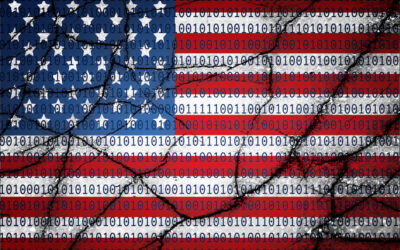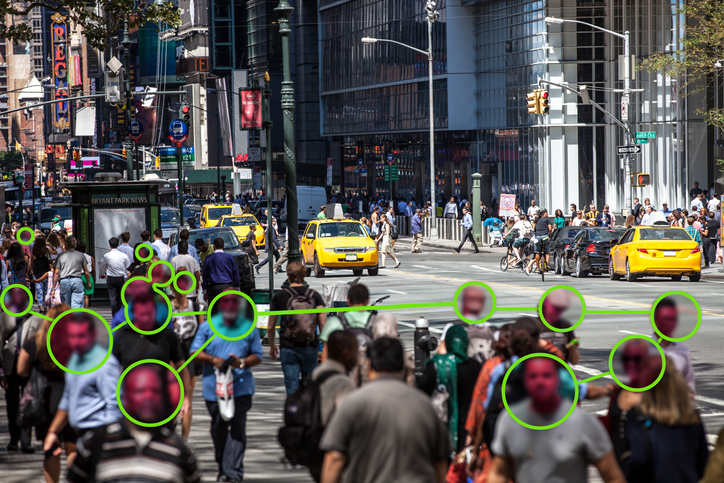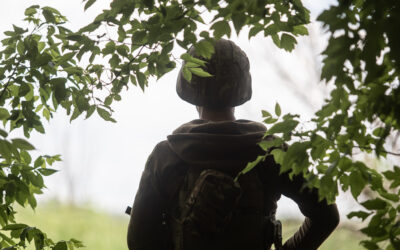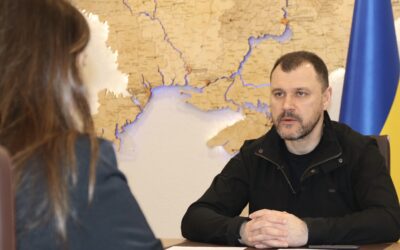
Exclusive Interview: Tracking the U.S. National Intelligence Strategy
SUBSCRIBER+ EXCLUSIVE INTERVIEW – The Office of the Director of National Intelligence (ODNI) is offering some rather overt clues about just how the country’s 18 […] More

Farah Pandith, Former Special Representative to Muslim Communities, US Department of State

Farah Pandith served as a political appointee under Presidents George H.W. Bush, George W. Bush, and Barack Obama, and most recently she was the first-ever Special Representative to Muslim Communities, serving both Secretaries Hillary Clinton and John Kerry. She is the author of How We Win: How Cutting-Edge Entrepreneurs, Political Visionaries, Enlightened Business Leaders and Social Media Mavens Can Defeat the Extremist Threat.
Jacob Ware, Research Associate for Counterterrorism, Council on Foreign Relations

Jacob Ware is a research associate for counterterrorism at the Council on Foreign Relations. He holds master’s degrees from Georgetown University’s Walsh School of Foreign Service and the University of St. Andrews.
As with 19 years ago, New York City once again finds itself at the epicenter of a devastating global catastrophe. As the coronavirus continues to take lives, crush the economy, and increase fear of the unknown, it is reminiscent of another pervasive and enduring threat: violent extremism. Like our fight against hate, COVID-19 introduced itself with a devastating initial attack on our public and institutions, and is likely to remain a threat, returning in waves for the foreseeable future. The lessons from a disjointed global fight against violent extremist ideology (countering violent extremism, or CVE) are important today because their application will allow us to succeed where we have failed in fighting hate.
Why Government Matters Most
Be the leaders we need. As with any crisis, leadership from the top matters. Immediate focus, commitment, and resolve is a must. Organizing the effort out of the gate, and allocating sufficient resources, sets the stage and initiates the response. However, leveraging internal infrastructure across the federal government is not enough. There needs to be a strategy for the short, medium, and long-term impact of the threat that is closely aligned with facts and can adjust to new realities. The president sets the tone for his/her administration, but also for the nation and the international audience.
Organize effectively and proactively. The response needs to be quick, spearheaded by an experienced point person reporting directly to the president. After 9/11, several people wore different hats, all related to but not solely focused on the entire strategy. America needed a CVE Czar, fully in charge of the Soft Power War (otherwise known as the War of Ideas). As with the Hard Power War, the single point of contact coordinates strategy, but more importantly, has the authority to leverage all forms of national power. In the COVID battle, Dr. Anthony Fauci is admirably filling a needed role as a lead strategist—but alongside the Task Force and its murky responsibilities. Government needs to be proactive, identifying threats early in their emergence, and not reactive. It needs to be responsible with its rhetoric, providing only measured, truthful analysis, not politicized partisanship. And it needs to think about what comes next, and how the crisis affects the American public and its future, beyond the immediate emergency. It took years before the U.S. government was able to more effectively organize the War of Ideas, and even now it is hardly working well. The key is to go all in. Use all the tools in the toolbox and go forward at scale, at pace, and with sophisticated organization.
Listen to local leaders. The majority of America’s CVE programming is led at the national level through the Department of Homeland Security and Department of State. These large bureaucracies do not always work together easily and often compete for federal funding and leadership. Critically, they do not operationalize a seamless understanding of the threat—the lines between domestic and international hate are non-existent, and ideology has no borders. Thus, a top down approach is often complicated and inefficient. However, not only does locality matter to the success of CVE, but state and municipal governments are more nimble and have well established partnerships with communities. Thus, at the local level, initiatives can be targeted to realities on the ground, tailored to specific environments, and enhanced by trusted relationships. As the federal government faltered early in the COVID-19 fight, President Trump repeatedly proclaiming that the threat was overblown and that “one day — it’s like a miracle — it will disappear,” state and municipal leadership stepped up. Governors Andrew Cuomo of New York, Charlie Baker of Massachusetts, and Larry Hogan of Maryland, among others, have led the call for more urgent shutdowns and increased production of personal protective equipment and ventilators. The local governments should be empowered as much as possible with the funding and infrastructure they need—they have, in most cases, proven themselves competent and aggressive. The power of acceleration on the ground is vital—and we should be finding ways to enable grassroots organizations, community leaders, and elected local policy makers to apply their know-how and credibility.
Leverage all your expertise. The response should not just be whole-of-government, but whole-of-society, applying expertise and experience from a variety of professions as part of the nation’s response. Our CVE strategies have suffered from a narrow scope of “expertise,” when hate and extremism actually impact every aspect of our ecosystem. To advise Germany’s response to the crisis, Chancellor Angela Merkel has assembled a council of 26 academics, a group which includes “not just medical experts and economists but also behavioral psychologists, education experts, sociologists, philosophers and constitutional experts.” In national crises, we need all kinds of experts to tell us different things, and to leverage private actors as part of the fightback (“open power”). Merkel understood that, and Germany’s response has been world leading. We need to open the aperture and source solutions through a much larger network of peers.
Promote innovation. Reward courage both among non-profits as well as government agencies and encourage big and bold ideas to fight the virus. In the CVE fight, we stuck to what we knew, which was often based on a Cold War playbook. For the most part, there was very little willingness to experiment with bold new ideas—we mostly made do with what was familiar. Government needs to think differently about what is needed. It must be willing to go on the offense, at scale. During the 2016 presidential election, our country was attacked by a troll farm thousands of miles away. Imagine if we had trained and paid thousands of regular citizens, credible voices, to counteract disinformation and extremism flooding our social media sites. When dealing with online “troll farms” of extremists preying on youth, government’s response was that it was “too hard” to scale an effort of this kind. In the COVID fight, an army of regular people is once again needed, most immediately to conduct contact tracing to allow the country to reopen. What is stopping us from imagining thousands of people who need jobs learning new skills to help us get the data we need? There are hundreds of ideas that could have been tried with CVE—and still have not—because government will not take risks and cannot imagine how to get it done.
Take responsibility in protecting your front line. In the CVE space, government recognizes that it does not have the credibility or know-how to implement programs at the local level. The War of Ideas is fought through local solutions and credible, trusted organizations, most of which are small non-profit organizations. Their staff (often young professionals) build programs, conduct research, and engage with vulnerable communities, but are also often doxed and placed in danger, and come from organizations which do not have the grants or infrastructure to guarantee their staff’s physical safety or mental health. Nevertheless, we use these NGOs to do CVE’s complex, risky and harrowing work. Of course, those risks do not compare to those taken on by heroic frontline doctors and nurses in the COVID-19 fight, who are soldiering on despite shortages in equipment, intense fear, and exhaustion. Putting your life at risk is a tremendous sacrifice, and government’s priority should be to ensure those sacrificing themselves for the greater good do so with the knowledge they are safe and cared for. Our frontline workers are in danger, and need the best protection and support available. A fly over by the Thunderbirds is not enough.
Collaborate. Finally, governments should work together across borders. After NATO’s Article 5 was invoked after 9/11, a NATO coalition joined the United States in hunting al-Qaeda members in Afghanistan. But the same coordinated international effort has not been repeated for countering extremist ideologies, a shortfall now repeating itself during the pandemic. Better cooperation begins with a map of our strengths and weaknesses, our stakeholders and warriors, and of who is managing and who is struggling. We never created such a map in the CVE fight, and still do not have one now. How do you scale, how do you coordinate, without knowing what is out there? What efforts are being undertaken by governments but also private industry and NGOs? We need a full picture of the stakeholders and our “soldiers,” big and small; we need to carefully record, with discipline, what resources we have. Then you know where you can surge and where you can redistribute, across borders as well as at home.
Big and Small Businesses Are Critical Players
Accept the challenge, and join the fight. Businesses both have a stake in the fight and a role to play. The COVID-19 crisis, like the 9/11 attack and subsequent violence, impacts supply chains, the stock market, and stability and security. In the fight against ideologies of hate, business has stayed on the sidelines, reluctant to enter a war that is, they say, political. But the ecosystem of hate effects society in many ways, and business has been wrong to stay away. As a result of their caution, the effort to confront the ideology of hate misses out on many of the resources, expertise, and scaling that it needs to be successful. Companies have a far greater role to play in effecting change in culture and society—and could make a tremendous difference if they utilized their power to promote mutual respect, engaged on issues of diversity, and invested in communities fighting hate.
Adjust, and be creative. When it comes to national security, business is always part of the solution, and in the COVID-19 crisis, companies have quickly and aggressively responded where government created a vacuum of leadership. Some companies have repurposed their usual machinery to produce goods needed to fight the pandemic. Distilleries, for example, are making hand sanitizer. Athletic gear companies are producing face shields. Clothing companies are making facemasks for the public.
Take responsibility and correct your failures. There is also a special role to be played by technology companies, many of which are falling short in the fight against extremism. In the counterterrorism war, we were far too slow to think strategically about the technological battlefield, and nefarious actors were able to radicalize and recruit on social media sites before we awoke to the extent of the threat (and even after we awoke to the threat). More recently, social media has been weaponized, sometimes by foreign adversaries, to spread disinformation—in the lead up to the 2016 election as well as during the COVID-19 pandemic, where conspiracy theories run the gamut from anti-Semitic conspiracies about the virus’s origins to Luddite musings about 5G’s role. We cannot continue to let bad actors control the narratives on our social media platforms. Technology companies need to take more responsibility over disinformation and more and design a real response to this life changing threat. Facebook’s new oversight board might be a promising start.
Lead, but promote teamwork. Finally, in the absence of a clear, coordinated global system of effort, firms are operating largely independently. As a recent Boston Globe article noted, “the mobilization echoes the industrial ramp-up sparked by World War II, only this time the effort is far more ad hoc, rather than directed by the federal government rallying the nation to a common cause.” This is in itself a lesson: government needs to define early what is needed. Governments at both federal and local level need to continue calling for assistance, clearly delineating where they need support and how companies can help. And, as this fight endures, businesses need to continue playing a role in giving their communities and the public a fighting chance—stepping up where they have largely sat on the sidelines in the CVE space. The reason extremism is surging is because we have been lazy on hate and have not applied our tremendous skills in a coordinated effort.
All of Us Have Power
Think big – you are always part of the war. Finally, individuals play an important role in fighting national crises. Countering violent extremism works best when all of us, regardless of race, gender, age, and politics, join the cause, working to puncture Us v Them narratives in a thousand different ways. Citizens themselves can degrade extremist ideology and recruitment by affecting the communities in which they live—online and offline. Too often, we miss out on the immense power of the public, as divisive leaders seek to exploit divisions between us rather than unite us against the cancerous undercurrents in our societies.
Think small, too – little contributions build up. The fight against extremist ideologies has showcased each human’s unique capacity to make a positive change. A former extremist, for example, can persuade a potential ISIS recruit from joining their armies through one to one interventions. Now, time and time again since the outbreak of the pandemic, international leaders have pleaded that we all play a role in the crisis. Firstly, the virus will die out when it runs out of new hosts, and for that reason we all bear a responsibility to isolate from friends, family, and workplaces, and practice good social distancing. Many communities which have followed stay-at-home orders have succeeded in stopping the virus’s advance. Secondly, nano contributors—such as the 18-year-old from Washington DC making face masks with his 3D printer—have the power to protect those on the front lines and alleviate the suffering of the poorest and weakest among us. The key to victory lies with the citizens of the world, but only if we all unleash our power.
Humanity and Purpose. Philanthropists have an important role in American society. Grants rewarding creative thinking, research, moonshot ideas, and more fund NGOs doing unique work in many areas. Often, philanthropic support—including so-called “Big Bet” grants—paves the way for breakthroughs in research, implementation of new ideas, and leadership. While the scale of funding or interest in the War of Ideas has been limited in the twenty years since 9/11, philanthropists are in many cases stepping up in funding bold solutions to the coronavirus pandemic. Researchers seeking treatments and vaccines and non-profits providing desperately-needed aid need to be encouraged with funding and rhetorical support; philanthropists should take a leading role, thinking out of the box and donating to society-led organizations that make a difference to the effect of the virus as well as big research institutions. American philanthropy is the most generous in the world. We need its strength more than ever.
Humankind’s Future
Imagine the worst-case scenario and work proactively. The most obvious lesson also represents our most consequential failure – always be one step ahead. Government has consistently failed to imagine extremists’ worst intentions and capabilities—and as a result, we have been slow to respond to the rise of extremism and hate. Some analysts work on doomsday scenarios and offer “implausible” consequences of intelligence they receive, but our policymakers mostly do not create strategies for those “what ifs?”. The September 11, 2001 attacks, for instance, were an extraordinary event. The threat was from al-Qaeda, of course, but it was also from something far bigger: a growing global movement of Us versus Them ideologies. We focused on the terrorist organization and its leader, and other groups that showed vitality—and measured success through the metrics promised by hard power. But we did not imagine a world where the so-called Islamic State could rise up, or one in which women and children could be recruited.
The lesson is to connect dots on what is happening worldwide—and to scope out even the most improbable scenarios. And then, to plan. Despite early warnings from China, Iran, and Italy, as well as an early lesson on how to effectively tackle the crisis from South Korea, the U.S. and many of its European allies were slow to respond to the virus’s exponential growth. Neither the legislative branch nor the executive branch took the threat seriously, and no one wanted to expend their political capital to fight for resources—they did not believe the threat was as grave as experts warned. American experts have been talking about pandemic preparedness for decades—yet the ball is always kicked down the field.
COVID-19 is not unlike violent extremism. Both are global threats, which ignore our traditional nation-state orientations. Both move quickly and have both short- and long-term consequences that we must address simultaneously. And both threats thrive largely due to government inaction, and in some cases, lies.
Maybe the lessons we’ve learned from an ad hoc, non-fully collaborative fight against violent ideologies can teach us how get this COVID-19 response right. On both fronts, we need to commit to the fight. Do not declare victory too early, or expect to win on the cheap, or be happy to jump from hotspot from hotspot. Commit, stay focused, and go all-in. For those of us born after World War II, this is the greatest challenge we have ever faced. But we do have new ideas, tools, and networks to create the response we need. If we realign our response and learn from the past, we have the chance to not just set up a strategy of success, we have a chance to build a new world.
Read more expert-driven insight, analysis in The Cipher Brief
Related Articles

SUBSCRIBER+ EXCLUSIVE INTERVIEW – The Office of the Director of National Intelligence (ODNI) is offering some rather overt clues about just how the country’s 18 […] More

SUBSCRIBER+EXCLUSIVE INTERVIEW – Hostage negotiations are one of the most difficult political issues for a U.S. administration to deal with, particularly in light of a […] More

CIPHER BRIEF REPORTING — On the outskirts of the battle-worn eastern Ukrainian city of Bakhmut, where Russia’s most effective mercenary force once tallied Moscow’s most […] More

Analysis by experts from the Special Competitive Studies Project EXPERT ANALYSIS — In an era of information overload, the rise of AI and machine learning tools, […] More

CIPHER BRIEF REPORTING – Kyiv, Ukraine – Ukrainian President Volodymyr Zelensky recently announced new sanctions against more than 650 individuals and legal entities that the […] More

BOTTOM LINE UP FRONT: A crucial decision by Germany to provide Leopard II main battle tanks to Ukraine and to allow other Leopard-equipped militaries to do […] More
Search